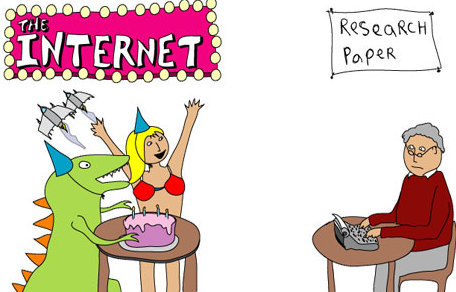Just when does an adolescent transform into a mature, responsible adult? Some parents who are still cooking, washing and picking up after their 18 year old offspring may suspect the answer is never. These parents may feel vindicated when they hear of two Dartmouth researchers who claim that a person's brain continues developing toward adult maturity well into their early twenties.
Researchers Abigail Baird and Craig Bennett say their research, appearing in the journal Human Brain Mapping, has helped them achieve a better understanding of when key structural changes cease in the brain, and the physiological onset of adulthood begins.
Their research consisted of examining the brains of 18-year-old Dartmouth freshmen students who had just relocated themselves in order to attend the college. To achieve comparative results, a group of older students, aged 25 to 35, were used as a control group. "During the first year of college, especially at a residential college, students have many new experiences," says Baird. "They are faced with new cognitive, social, and emotional challenges. We thought it was important to document and learn from the changes taking place in their brains."
The team's experiment returned results that were consistent with their initial hypothesis; that there are significant changes taking place in the brains of people beyond age 18. The researchers say that the changes were localized to areas of the brain that integrate emotion and cognition. These areas of the brain are important, and in combination act as the interface between our internal emotional world and our perception of the external environments in which we live. "The brain of an 18-year-old college freshman is still far from resembling the brain of someone in their mid-twenties," says Bennett. "When do we reach adulthood? It might be much later than we traditionally think."
The team's accomplishment is an important addition to a mounting body of research committed to the period of human development between adolescence and adulthood. Research such as this may one day inform parents about what their children are going through psychologically as they grow toward the responsibilities of adulthood, and, more importantly, when and how they are likely to get there. Is it possible that "protecting" adolescents from worldly experiences may actually stunt their progress toward adulthood? Perhaps this research should come as a warning to parents that wrapping kids in cotton wool will not ultimately help them develop their mental faculties as much as sending them out into the big-bad-world will.
Source: Dartmouth College
My thoughts: Sure I have gotten married, but I am living in the same apartment I did during grad school and have not changed my lifestyle to represent being an adult in any other way. Although, since the wedding I do own a large amount of expensive kitchen accessories, some of which I am still not sure about the function they actually serve. I feel as though a lot of people in my circle of separation are experiencing what we see as setbacks. We are no longer sure if we want to work in the field in which we earned our BA (or BS), we are getting ourselves into serious debt that often requires the assistance of our parents to recover from, and the majority of us have had to move back home while we 'get back on our feet'. Now, what I do not understand is how so many people from stable families end up 'off their feet' in the first place. What is happening within our society to cause this?
Of course, I am not putting all of the blame on the ever popular scapegoat that is society, but I do think the fact that this is so widespread indicates that it has more to do with some sort of institutionalized system rather than individual differences or character flaws. There is also this luxury element that comes into play which allows us to be picky. We were told by our parents that we could be whatever we wanted when we grew up, and all we needed to do was go to college and the world would be ours! What an exciting sentiment, which was possibly true for the generation or two before ours, but is certainly not true today.
Yet the promise of being able to do what makes us happy still lingers which makes settling for a stable job increasingly difficult. So what do we do? We go back to school. Perhaps that Master's degree will do what the Bachelor's could not. Perhaps more doors will swing wide open for us and our soul searching will finally end and we will be 'happy'. I think this is a possibility, but I also worry that this is simply another way of setting ourselves up for disappointment. Once we get the next degree and start the new job will we remain happy? Of course not, there are always going to be days, weeks, months, and even years when we despise our jobs or superiors. I think this is part of our problem though, we have been told that we will find this elusive happiness and that we have every right to continue to search for it. This will continue to be our downfall. Our parents learned to suck it up and go to work every day, sometimes at jobs and places they hated, because they understood their adult responsibilities and obligations. Whereas we have somehow managed to simply have our happiness to be concerned with...

